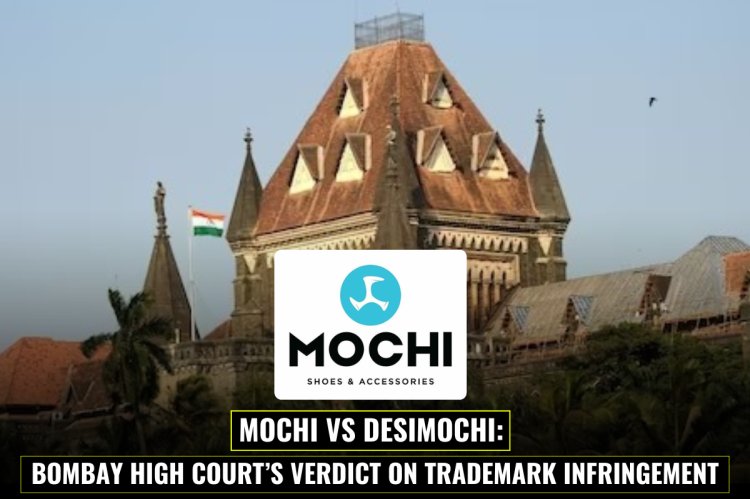"Mochi vs Desimochi: Bombay High Court Rules on Trademark Dispute in Footwear Branding Case"
Discover how the Bombay High Court ruled in the trademark infringement case between Mochi and Desimochi, setting a key precedent in Indian footwear branding rights.

Introduction
In a significant ruling for the trademark landscape in India, the Bombay High Court recently granted an interim injunction against Nice Shoes LLP for using the mark ‘DESIMOCHI’. The decision came in response to a lawsuit filed by Metro Brands Ltd., the owner of the well-known footwear brand ‘MOCHI’, which alleged trademark infringement. This case underscores the importance of protecting well-known trademarks from misappropriation and reinforces the Indian legal position against passing off.
Case Background
Metro Brands Ltd., a leading footwear company, has been operating since 1955 and has used the trademark ‘MOCHI’ since 1977. The company holds registered trademarks under multiple classes and has a strong market presence in India and abroad.
In August 2022, Metro discovered that Nice Shoes LLP was using the mark ‘DESIMOCHI’ on its website (www.desimochi.com) and for selling footwear under the same name. Attempts to resolve the issue amicably through notices failed. In November 2023, Metro pursued an action before the WIPO Arbitration and Mediation Centre. However, the claim was dismissed due to WIPO's requirement to establish ‘bad faith’ in the defendant’s actions.
Metro then approached the Bombay High Court, seeking an injunction against the unauthorized use of its trademark.
Key Legal Issues
The Court examined three critical legal aspects in this case:
- Validity of the Plaintiff’s Trademark: Whether ‘MOCHI’ was issued with a disclaimer and if such a disclaimer applies to subsequent registrations.
- Impact of Prefix Addition: Whether adding ‘DESI’ to ‘MOCHI’ distinguishes the defendant’s mark from the plaintiff’s.
- Authority of WIPO Order: Whether the WIPO ruling had any bearing on the case under Indian trademark laws.
To know more about this you can follow the link below:
Court’s Analysis and Observations
Justice R.I. Chagla noted that Metro’s trademark ‘MOCHI’ had been duly registered under Classes 18, 25, and 35 since 1977, with continuous and extensive use. The Court rejected the defendant’s argument that the plaintiff’s registration had a disclaimer, clarifying that the disclaimer applied only to the letter ‘M’ and not the word ‘MOCHI’.
Additionally, the Court highlighted that Nice Shoes LLP’s own failed attempt to register ‘DESIMOCHI’ weakened its position. The Court emphasized that the WIPO ruling held no relevance in this case since Indian law does not mandate proving ‘bad faith’ for trademark infringement claims.
A crucial takeaway from this ruling is that international intellectual property rulings should align with India’s legal framework to ensure enforceability. The Court reaffirmed that using a deceptively similar mark for identical goods can constitute infringement, as it inevitably leads to consumer confusion. Moreover, adding a generic prefix like ‘DESI’ does not create a sufficient distinction if the original mark remains recognizable.
Court’s Decision and Rationale
The Bombay High Court ruled in favor of Metro Brands Ltd., granting an interim injunction against Nice Shoes LLP. The Court dismissed the defendant’s argument that Metro had delayed seeking relief, reiterating that delay alone does not negate a trademark infringement claim, particularly when dishonest adoption is evident.
Additionally, the Court observed that ‘MOCHI’ qualifies as a well-known trademark under Section 2(1)(zg) of the Indian Copyright Act. This recognition further strengthens the protection granted to established brands under Indian intellectual property laws.
Impact and Legal Takeaways
This ruling sets an important precedent for businesses protecting their trademarks from unauthorized use. Some key takeaways include:
- Stronger protection for well-known trademarks: Companies with established brand identity have a higher chance of obtaining legal protection against deceptive branding.
- Precedent for future trademark disputes: Businesses facing similar issues can cite this judgment to secure injunctions against infringers.
- Clarification on trademark disclaimers: A disclaimer in one registration does not automatically apply to others, reinforcing the independent nature of each registration.
- Alignment of international and Indian trademark laws: The ruling emphasizes that international rulings, such as those by WIPO, must be interpreted in light of India’s distinct legal framework.
Conclusion
The Bombay High Court’s judgment in Metro Shoes Ltd. vs. Nice Shoes LLP serves as a landmark decision in Indian trademark law. It reinforces legal safeguards against brand misappropriation and passing off while clarifying key principles of trademark registration and enforcement.
For businesses, this case is a reminder of the importance of proactively defending trademarks and ensuring robust brand protection strategies. With this ruling, Indian enterprises can find renewed confidence in the strength of the country’s intellectual property laws, ensuring that their hard-earned reputation remains protected against infringement.












